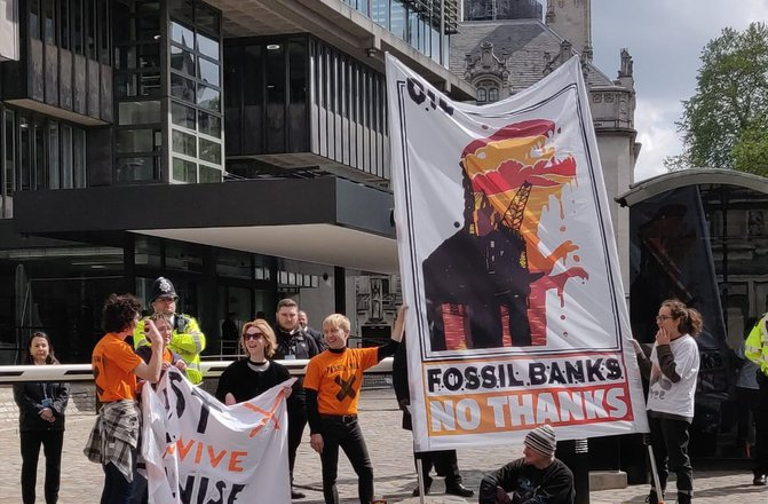On Thursday, May 2nd, I joined a group of students from Oxford on an early train to London. Dressed in our best corporate attire, we used shares proxied by a supportive NGO to enter the Barclays Annual General Meeting. When in his opening speech, Chief Executive Jes Staley brought up climate change, that was our cue. “Tell the truth!”, we shouted, standing as security swarmed around us. “Barclays banks climate chaos!”
Reckless bankers
In response to a growing wave of protest, Barclays management is trying to clean up its image. But according to a recent report by BankTrack, Barclays lends more money to fossil fuel companies than any other European bank, as “the top European banker of fracking and coal”.
Barclays also tops other European banks in funding for fossil fuel expansion, as in, the exploration and development of new fossil fuel reserves. But most existing reserves—an estimated 82 percent –must stay underground to avoid warming of over 2C. To meet the internationally recognised 1.5C target, we can afford to burn even less.
To be fair, the problem is not Barclays alone. The top 33 global banks collectively lent $1.9 trillion to fossil fuel companies between 2016 and 2018.
The Paris Agreement, which big banks including Barclays have pledged to support, calls for financial flows to be “consistent with a pathway toward low greenhouse gas emissions”. Responding to increased scrutiny, Barclays and others have started developing new fossil fuel policies, for instance, committing to stop lending to certain kinds of coal projects.
The BankTrack report, though, shows that no major bank has a policy compatible with a 1.5C or 2C warming target. Instead, big banks are supplying the money to send us on a hell road to 4C warming or more.
The dissimulation coming from Barclays top management indicates there will be no change of course.
At the recent AGM, the Chairman boldly claimed the bank had “moved away from the dirtiest fuels”. Yet despite reductions, Barclays along with other banks continues to finance coal and tar sands, despite the scientific consensus that most, if not all, tar sands must stay in the ground to avert runaway climate change.
Speaking after the Chairman, Chief Executive Staley offered his own bland reassurances. “We are already doing a considerable amount to support [the] transition to a low-carbon economy,” he declared.
But this “considerable amount” is not the necessary amount to avoid cataclysmic outcomes.
If we let the bankers have their way, if we continue on a pathway to 4C warming, we will pass on a planet ravaged by climatic shocks, swathes of it left uninhabitable. The effects on human society mean that we will also have lost our ability—economic and political—to do anything more about it.
Time for something radical
Relying on voluntary action from private banks—let alone from the fossil fuel companies themselves—is clearly foolish.
What we need instead is ambitious state intervention. And we need to focus that intervention on those responsible for producing fossil fuels.
Zeroing in on producers—rather than going with the conventional consumer focus—is likely to be more effective. It is also clearly more equitable, shifting the cost of a green transition onto the companies currently profiting from climate change.
Most producer-oriented policy ideas target fossil fuel companies rather than the banks that fund them. These policies include cutting subsidies, imposing new taxes, full or partial bans on new coal, oil and gas licensing, and even nationalisation.
Measures like these are necessary. But we cannot leave out the banks.
Instead, we should heed calls for a reformed banking system. This means reducing the role of private commercial banks and developing public banks with a mandate to prioritise social and environmental benefits.
Public banks in Germany and Costa Rica have already played an important role in funding green projects. Elsewhere, politicians are looking to replicate this success.
The Green New Deal legislation proposed by Alexandria Ocasio-Cortez in the States mentions public banks.
Meanwhile, the Labour Party in the UK has developed a comprehensive vision for a “new public banking ecosystem”. This will include a National Investment Bank to “[confront] the key social and environmental challenges of the 21st century, such as climate change.”
How do we make it happen?
Having the right ideas is one thing. Building the power to make them a reality is another.
Currently, that power is concentrated on the wrong side; it lies with the banks, the fossil fuel companies, and the politicians they lobby.
But the political balance is changing.
The School Strikes, Extinction Rebellion protests, and talk of a Green New Deal are pushing climate change up the agenda in the UK. Our intervention at the Barclays AGM was a minor episode in this series. But perhaps my favourite moment was when the private security guards, paid by Barclays to remove rowdy activists, congratulated us on a job well done.
Even as public opinion shifts, though, our political class remains divided.
The Conservatives voted to pass Labour’s “climate emergency” motion through Parliament, but the Tory support looks nothing short of hypocritical given their recent actions (and inactions).
Only political actors on the left are demonstrating anything like the understanding, commitment or ambition needed to tackle climate change.
There is a long-standing reflex to seek “bipartisan”, “pragmatic” or “moderate” solutions. But just like Chief Executive Staley’s phrase, a “considerable amount”, these words are a polite cover for inadequacy and failure. We do not have the time to muddle through with half measures.
The way forward is to channel popular support for action on climate change into an organised movement. The power of that movement—marshalled to support a left government—is our best shot at doing something meaningful while we still can.
Teaser photo credit: Activists protesting outside Barclays AGM, 2nd May 2019





